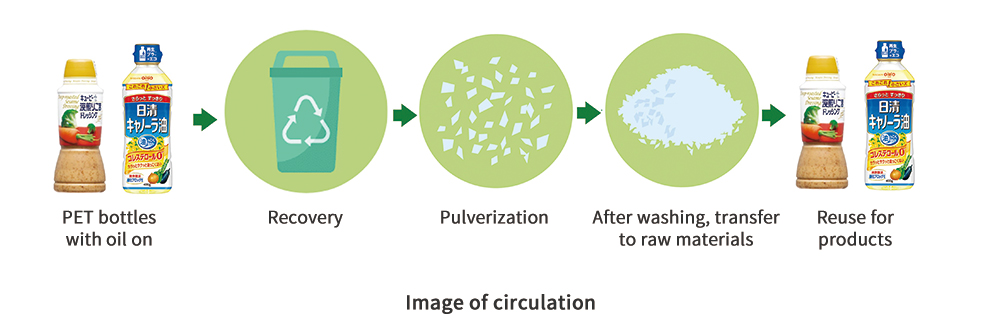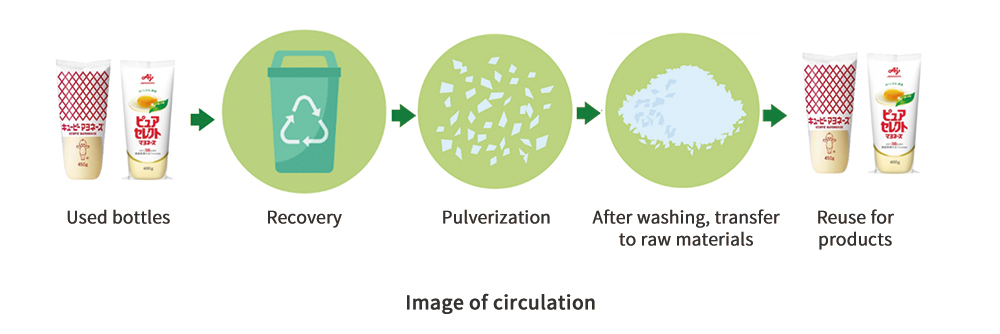Reduction and Reuse of Plastic Emissions
Approach to Reduction and Reuse of Plastic Emissions
The Kewpie Group uses plastics for food containers and packaging. While plastics offer advantages such as being light and hard to break, it has been pointed out that plastics have an impact on the global environment, including in relation to marine plastic waste.
The Kewpie Group recognizes that plastic waste is a material theme that has a significant impact on ecosystems and the environment, and is implementing initiatives to reduce the use of virgin petroleum-derived plastics and to encourage resource recycling.
Kewpie Group Plastics Policy
The Kewpie Group formulated the Kewpie Group Plastics Policy and is accelerating efforts to reduce plastics used in business activities aiming to create a circular economy.
Kewpie Group Plastics Policy
We will help realize a sustainable circular economy by implementing 3R+Renewable.
- We consider reducing environmental impact in design from the development stage.
- We cooperate and promote this throughout the value chain.
Adopted 2019, revised 2022
Main Initiatives to be Pursued Going Forward
- Further reductions in the amount of plastics used, mainly through container weight reduction
- Introduction of recycled plastics and biomass plastics
- Container and packaging design for easy sorting
- Joining industry initiatives to promote the recovery and recycling of plastics
Weight reduction of dressing containers

Adopted bottles made from recycled plastic

Plastic Reduction in Container and Packaging Design
Product containers and packaging are essential to maintaining the quality of the product and preserving its good taste, but their production consumes energy and they turn into waste after use. The Kewpie Group remains committed to simplifying and reducing the weight of containers and packaging.
Kewpie Group Basic Policy on Container and Packaging Selection (Japanese version) (152KB)
Creating Lighter, Simpler Packaging
| When Started | Target | Details |
|---|---|---|
| Feb 2024 | Commercial products Hoshie-nu Pasta Sauce Pakitte series |
Plastic consumption reduced 25% by changing container size |
| Jul 2023 | Commercial products New Exter |
Weight reduced in bottles by reducing the amount of plastic used |
| Jan 2023 | Commercial products Kewpie Hoshienu brand products in 1000 mL and 500 mL bottles |
Reduced amount of plastic used in cap by about 9% by reducing weight of the products |
| Sep 2022 | Kewpie Aeru Pasta Sauce series sauce type | Reduced amount of plastics by about 7% by slimming individual package sizes |
| Aug 2022 | Verde Toast Spread series | Reduced plastic use by about 10.9% by making laminated tubes in containers thinner (Adopted for all 2023 series) |
| Mar 2022 | Soft Rice Crackers with Vegetables, Kewpie Baby Snacks series |
Reduced amount of plastics used by 35% by changing materials used for outer packaging, individual packaging, and trays. Also, ease of recycling considered by changing to a single material |
| Feb 2022 | Verde Whip series | Reduced amount of plastic used in containers by about 9.3% by thinning container walls |
| Feb 2022 | Salad Club - package film | Changed standards for films used for packaged salads (making thinner and smaller in size) |
| Jan 2022 | Salad Club - packaged salad trays | Weight of packaged salad trays reduced about 10% compared to conventional products |
| Mar 2021 | Kewpie Smile Cup baby food series, Yasashii Kondate nursing care foods series | Reduced amount of plastics by eliminating outer lid on top |
| Mar 2021 | Tamago Tappuri Boro (round biscuits with plenty of egg), Kewpie Baby Snacks series |
Reduced amount of plastics used by about 25% by changing inner and outer packaging |
| Apr 2019 | 380-ml Kewpie dressing | Reduced weight of bottle material used without reducing strength or changing shape profile |
Using Packaging With a Lower Environmental Impact
| When Started | Target | Details |
|---|---|---|
| Feb 2024 | Kewpie Aeru Pasta Sauce series | Changed outer packaging to paper |
| Feb 2024 | Kewpie Three-Minute Cooking soup ingredients of Yasai wo Tabeyou (Let's eat vegetables!) series | Changed outer packaging to paper |
| Jul 2023 | Kewpie Tasty Dressing, dressing with function claims | Adopted bottles made from 100% recycled plastic (the first case for seasoning made in Japan; researched by Kewpie) |
| May 2023 | Verde Pakitte (snap pack) series | Reduced amount of petroleum-based plastics by 40% by blending biomass-based plastic to a container component (those that hold the contents) |
| Jun 2021 | Kewpie Tasty Dressing | Adopted bottles that contain 30% recycled plastics*
* Plastics recycled by mechanical (physical) recycling, a method of recycling plastic bottles mainly used for soft drinks, after being crushed, washed, and treated at high temperatures for a specified time to remove contaminants. |
| Aug 2020 | Salad Club Sozai Pouch (ingredients pouch) series | Pouches made with plant-based plastics* are used in 12 of the total 19 products (Adopted for all 2022 series)
* Plant-based plastics: Biomass-based plastics made from renewable organic resources such as sugarcane byproducts. |
| Feb 2020 | Kewpie Dressing (stick type) | Uses about 15% recycled plastic in outer packaging |
Kewpie Group Eco Label

Example
We display the Kewpie Group’s own original eco label.* Having established environmentally friendly standards on container packaging, Kewpie assigns the Kewpie Group Eco Label to products meeting these standards to easily convey to customers that Kewpie products are environmentally friendly.
* Started in Feb 2024
Reducing Plastic in Manufacturing and Distribution
In addition to reducing the amount of plastic in product containers and packaging, the Kewpie Group is working to reduce plastic at every stage of its operations, from procurement to manufacturing, distribution, and consumption.
Recycling of Product Distribution Containers

Left: Recycled product Right: Existing product
Plastic Containers for Liquid Eggs
Kewpie Egg Corporation is engaged in an initiative* to recycle plastic containers for liquid eggs and other egg products and to use recycled products. The recycling of plastic containers that were previously disposed of has led to a reduction in plastic waste.
*Started in 2020
Collaborative Efforts for Resource Recycling
PET bottles with oil (e.g., dressing bottles)
Kewpie has begun working with Nisshin Oillio Group Inc. to recycle PET bottles used for dressing and cooking oil. There is concern that PET bottles with oil on them may be left with oil during the recycling washing process, affecting the quality of recycled PET, The recycling system has not been implemented in society. By collaborating with other companies that handle products that use oil, we will be able to reduce the amount of PET bottles used for oil-based products and improve the quality of recycled PET. We aim to create a society in which PET bottles used for oil-based products can be recycled as a resource.
In FY2024, a demonstration experiment will be conducted at eight AEON and AEON Style stores in Chiba City to collect used PET bottles with oil in order to establish a technology that utilizes the knowledge of both companies and to efficiently collect samples for further technological verification.

Mayonnaise Bottle
Kewpie has begun collaborating with Ajinomoto Co., Ltd. to recycle mayonnaise bottles as part of the Clean Ocean Materials Alliance (CLOMA), a cross-industry platform for public-private partnerships to solve the problem of marine plastic waste in which both companies are participating. Mayonnaise bottles in Japan are mainly made of polyethylene (PE), a plastic material that is widely used for food packaging, but because PE is often combined with other materials and types of materials, a horizontal recycling*1 system similar to that used for PET beverage bottles has not been implemented in society.
However, due to the types of materials used and the fact that many of them are compounded with other materials, the horizontal recycling*1 mechanism as typified by beverage PET bottles has not been implemented in society. In addition, in order to realize horizontal recycling through material recycling*2, it is important to collect plastic made of the same material as mayonnaise bottles, clean it, and recycle it. By working together to address these issues beyond the boundaries of the corporate sector, we aim to create a society in which mayonnaise bottles can be recycled as a resource.
In fiscal 2024, a demonstration experiment will be conducted at one Ito-Yokado store in Kawasaki City to collect used mayonnaise bottles.
*1Horizontal recycling refers to the recycling of used product containers and packaging as raw materials to manufacture the same type of product containers and packaging again in order to effectively use limited resources.
*2Material recycling is a recycling method in which waste materials are reused as raw materials without changing their properties.



